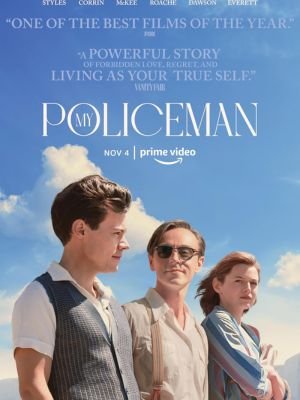
My Policeman could have easily flown under the radar. It’s a small period drama, adapted from Bethan Roberts’ 2012 novel about a love triangle between gay men in a time when homosexuality was illegal in the UK. But once you’ve cast the world’s biggest pop star, everything changes — not just for die-hard Directioners. This is Harry Styles’ first lead role. All eyes are on him.
So let’s talk about the Grammy-winning elephant in the room: as policeman Tom, Styles is fine. He’s solid. He was also best used as an object of desire in Don’t Worry Darling; that famous charisma and star power work nicely when woven into narrative beats. His casting makes most sense during the film’s early scenes, when both Marion (Emma Corrin) and Patrick (David Dawson, MVP) start making googly eyes at him. In fact, everyone swoons over his presence: furtive glances of lust flit every which way — it’s about as racy as post-war Britain gets.
If anything, My Policeman leans too heavily on the charm of its actors and the pretty period stylings around them. Ron Nyswaner’s script is fatally thin, an adaptation that strips away the inner monologues of the book and ends up fumbling around basic character types instead. We know next to nothing about these people beyond their surface-level attractions and interests (Marion likes “culture”, and says as much). The dialogue lurches all too frequently into stilted awkwardness; even a good actor would struggle with lines like, “We’re just two confused people, aren’t we?” An inexperienced actor can only thrash.
Cliches soon stack up: there is a shimmering dissolve to indicate a flashback (you can almost hear the harp); a hand makes wave motions out of an open car window, an indie staple; and in one mildly excruciating scene, Patrick draws Jack like one of his French girls. (“Ordinary people have the best faces,” says Patrick, without intentional irony, of a Vogue cover star.)
The modern-day drama fares slightly better, as veteran players Linus Roache, Gina McKee and Rupert Everett fill their faces with regret (even if some accents have mysteriously changed during the intervening years). But it is all so deeply dour. Everything, from the actors’ hair downwards, is grey — nothing but weepy wistful looks and stiff upper lips.
And while it doesn’t skimp on sex scenes, for a queer film it feels oddly old-fashioned. The struggles and secrecy of its story may have felt revelatory 30 years ago; today they verge on hammy. That’s not to say these brutal unjust histories shouldn’t be told. But you do wonder if the gay experience needs to — once again — be characterised by homophobic slurs, violent assaults, and gay relationships only existing at the expense of heterosexual ones.
Also, Read On Fmovies
